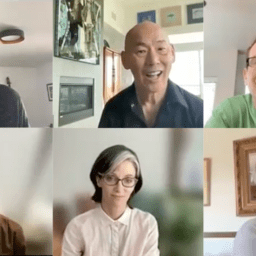On May 12, Apple TV+ released Still: A Michael J. Fox Movie. The film weaves together multiple aspects of Fox's life, from his rise to fame to the many ways Parkinson's influences his life and his family.
While Still is receiving significant press and has garnered many positive reviews, most significantly, it comes on the heels of a recent surge in popular media featuring Parkinson's. In the past year, Parkinson's has featured prominently in multiple shows and movies, including—
- Kaleidoscope—a Netflix crime-drama series
- Shrinking—an Apple TV+ comedy series
- Stutz—a Netflix documentary about psychotherapy
- The Long Road to Hope—a companion film to the book Ending Parkinson's Disease
- The Zone—a documentary about a pioneering rock climber who is living with Parkinson's
Over the years, Parkinson's has also been highlighted in many other notable films and shows, including--
- Love and Other Drugs
- Awakenings
- Ray Donovan
- American Ninja Warrior
- A Late Quartet
The Pros and Cons of Parkinson's Media Representations
The surge in representation of Parkinson's in popular media is not perfect. For one thing, some representations of Parkinson's may be emotionally challenging for people with Parkinson's and their care partners to watch. Additionally, even a movie that explore Parkinson's extensively, like Still and The Long Road to Hope, cannot demonstrate the full scope of how Parkinson's can impact a person's life. Parkinson's is too complicated, and each person's experience is too unique for that to be feasible. So, please always keep that in mind whenever you watch a representation of Parkinson's in popular culture.
Despite these limitations, representations in popular media on balance are good for the Parkinson's community because they increase awareness of the far-reaching effects of Parkinson's. Moreover, that these recent stories have been released so close together contributes to the awareness that Parkinson's is increasingly common.
BIG Media Depictions of Parkinson's: What They Get Right and What They Get Wrong
Kaleidoscope
Kaleidoscope is a movei that tells the story of Leo Pap, who is diagnosed with Parkinson's while serving a prison sentence that resulted from a botched robbery. Pap blames his former partner for his imprisonment. Following his Parkinson's diagnosis, Pap develops a plan to escape prison and steal from his former partner as payback.
Pap is played by Giancarlo Esposito, who depicts Parkinson's through a masked facial expression, tremor, and lack of dexterity. His emotional reactions to his diagnosis and symptoms are realistic and relatable, but the series makes one significant mistake: treating Parkinson's like a death sentence. This happens most notably first when Pap's physician from prison calls Parkinson's an "incurable, terminal illness" and second when Pap says he has maybe two or ten years to live even though he appears to be in the relatively early stages of Parkinson's.
While Parkinson's presents significant challenges and can contribute to other health issues, it is not terminal. For example, multiple studies have found that the lifespan of people with Parkinson's is near the average for people of similar demographic backgrounds without Parkinson's.
Shrinking
This Apple TV+ series focuses on the lives of three therapists in southern California. One character, Dr. Paul Rhoades, played by Harrison Ford, is living with Parkinson's. Like Esposito in Kaleidoscope, Ford depicts Parkinson's effectively. He often keeps one hand hidden in a pocket or on his lap to hide his tremor, and he often moves rigidly, with a shuffling gait and reduced arm swing.
One of Paul's principal challenges is whether and how to tell his family about his diagnosis. Another issue he faces is whether he should stop driving because of issues he's experiencing with his vision.
Shrinking does a generally good job of depicting Parkinson's, and although the series is a comedy, Parkinson's is presented in a way that balances humor and seriousness. One issue that stands out as not so great is Ford's character's questionable relationship with his neurologist, whom he seems to see more frequently than is feasible, and with whom he has a relationship with questionable ethical implications.
Stutz
Stutz is a documentary movie directed by Jonah Hill that explores the therapeutic approach of Phil Stutz, Hill's therapist. Dr. Stutz's approach involves visualization techniques that he calls "the tools." Hill and Stutz demonstrate these techniques to overcome various challenges throughout the film. During the film, the viewer learns that Dr. Stutz has been living with Parkinson's for many years and that his experience living with Parkinson's inspires the urgency and directness of the therapeutic approach represented in "the tools."
Although this film is not explicitly about Parkinson's, people with Parkinson's may find value in the therapeutic tools the film describes and Dr. Stutz's observations about living with Parkinson's. For example, Dr. Stutz notices increasing rigidness in one scene, and he finds a piece of filmmaking equipment on which he can do modified push-ups and demonstrates a simple exercise that helps him improve his mobility that can be done anywhere, even on a movie set.
The Zone
The Zone is a movie that shares the story, philosophy, and legacy of Rob Wood, a renowned Canadian climber, as he embarks on a climb with friends following his Parkinson's diagnosis. The Zone touches on themes of finding meaning, connecting with nature, and valuing the elders in a community. While Wood's experience of Parkinson's and his role in his community is unique, the depiction represents many ways that one can live well with Parkinson's in their community.
Love and Other Drugs
Love and Other Drugs is a movie starring Anne Hathaway as Maggie Murdock, a person living with young onset Parkinson's (YOPD). This film explores Parkinson's and the issues those living with YOPD face, including medication management, alternative diagnoses, and relationships. The film presents Maggie's experience living with YOPD in considerable detail and focuses extensively on how Parkinson's, especially young onset Parkinson's, can influence relationships.
The film presents a detailed picture of Parkinson's, but there are some minor aspects that the film gets wrong. One example is when Maggie mistakenly calls "MSA" (multiple system atrophy) "MAS" when discussing differential diagnoses with a physician. Another is when Maggie casually tells a physician she is taking domperidone, a medication with a complicated approval history at the FDA. The physician doesn't inquire about the circumstances. While this is a minor oversight, it stands out because the movie's plot centers on a pharmaceutical salesman whose work involves newly approved medications.
Awakenings
Awakenings is a movie portrayal of neurologist Oliver Sacks' 1969 use of Levodopa to treat people experiencing Parkinsonism following the 1917-1928 encephalitis lethargica epidemic.
Robert De Niro stars in the film as one of the people treated by Dr. Sacks. In an interview about the film, Dr. Sacks praised De Niro's performance as a person living with Parkinsonism, saying, "I think in an uncanny way, De Niro did somehow feel his way into being Parkinsonian. So much so that sometimes when we were having dinner afterwards, I would see his foot curl or he would be leaning to one side, as if he couldn't seem to get out of it. I think it was uncanny the way things were incorporated."
Ray Donovan
On the Showtime crime-drama Ray Donovan, the main character's older brother Terry is a former boxer who lives with Parkinson's. Terry, played by Eddie Marsan, features prominently throughout the series, and his experience evolves, and his symptoms fluctuate as the series progresses. Terry receives deep brain stimulation (DBS) surgery and experiences complications and a lack of treatment effectiveness because of his lifestyle.
Documentaries
There are also many documentary movies about people living with Parkinson's and their families.
Here are six great examples:
The Adventures of an Aspiring Rock Star
Four Ways Media About Parkinson's Can Help You Live Well with Parkinson's
In addition to helping spread awareness about Parkinson's to a broad, global audience, here are four ways that representations of Parkinson's can help you live well with Parkinson's.
#1 - Education
A documentary movie—especially ones such as The Long Road to Hope—can be explicitly educational, and you might learn new facts about Parkinson's or new ways to manage your symptoms by watching them. Even fictional depictions can be helpful in this regard, but carefully examine any idea before incorporating it into your care plan.
#2 - Entertainment
Thinking about and living with Parkinson's can occupy a lot of your energy, and sometimes you might want entertainment that helps you forget about Parkinson's for a while. However, there can also be value in seeing how other people—whether real or fictional—live with Parkinson's. So while you might decide to watch something for its educational value, you might also appreciate simply watching someone experience something similar to what you experience.
#3 - Providing You with Resources to Share
A movie or show that features Parkinson's can help you by providing resources through which you can help educate others about Parkinson's. This can be useful for people you are close to and with whom you might cross paths.
#4 - Inspiration
Whether you are watching a documentary or a work of fiction, one of the best things that can happen is that you find inspiration to take constructive action in your life. Like Dr. Stutz, you may be inspired to increase the vigor with which you try to accomplish your goals or find small ways to help yourself remain mobile and motivated. Or, unlike Terry Donovan, you may be inspired to be cautious following surgery. Or, like Jimmy Choi, Rob Wood, and many others who have shared their stories in documentaries, you may be inspired to explore and expand your physical limits, grow wiser and stronger, and help raise awareness about Parkinson's.
Additional Resources
Jimmy Choi's Final Appearance on American Ninja Warrior
Oliver Sacks Discussing Awakenings
Ending Parkinson's Disease Book Website
Eddie Marsan on Portraying Parkinson's in Ray Donovan
UK National Health Service on Life Expectancy
WANT MORE PRACTICAL ARTICLES LIKE THIS?
You can learn much more about living well with Parkinson’s today through our Every Victory Counts® suite of resources. Each manual is packed with up-to-date information about everything Parkinson’s. Click the link below to order your manual(s).
Thank you to our 2023 Peak Partners, Amneal and Kyowa Kirin, and our Every Victory Counts Gold Sponsor, AbbVie Grants, for their ongoing support of these must-have manuals. Additionally, we’d like to thank Barbara and Dale Ankenman, Abby and Ken Dawkins, Bonnie Gibbons, Gail Gitin in loving memory of Gene Gitin, Irwin Narter, and Lorraine and J Wilson for their generous donations that allow us to make these resources available and free to all.


















